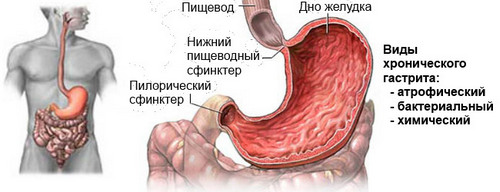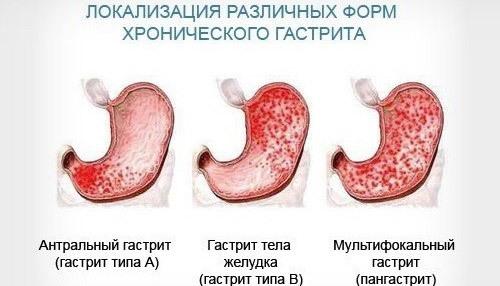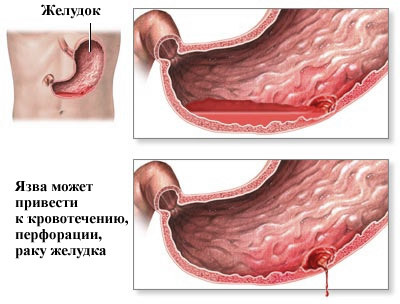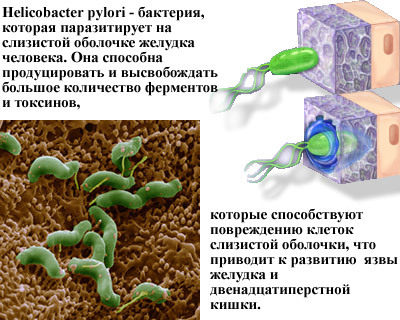Gastritis referred to as inflammatory or degenerative processes in the mucosa of the stomach, and sometimes affecting deeper layers of its walls, which are violations of the secretory and motor functions of this digestive organ. This disease affects adults and the elderly, and children. The chronic form is prolonged, characterized by regular recurrence.
Not so long ago among the reasons was called mostly errors in diet, bad habits (Smoking and alcohol consumption), stress, some associated diseases. Now a leading role in the formation of the disease is removed the bacteria Helicobacter pylori, infecting the gastric mucosa.
The principles underlying the therapy, have undergone some changes. Helicobacteria capable of long time to repopulate the digestive tract and cause illness, as long as the disease is not to be triggered by external factors: the weakening of the immune system, ingestion of irritants, hormonal disorders.
Gastritis is found in the modern world very often: according to some, almost every second adult inhabitant of the planet is familiar with his symptoms. But do not assume this disease with normal or inevitable. Be sure to take measures to treat the disease, otherwise dangerous complications from an ulcer to stomach cancer.
The range of stimuli that can damage the stomach is extensive. It can be aggressive chemicals (acids, alcohols or alkalis), pharmaceuticals and poorly chewed too hot or cold, spicy, fried, smoked or salty foods.
In adults, gastritis does not develop for one reason, and influenced by several factors. First, there are violations of the diet and uncontrolled intake of anti-inflammatory medications that injure the gastric mucosa. And here it already becomes susceptible to infection, including the Helicobacter pylori infection. In the future, can be triggered and autoimmune mechanisms, when the cells of the mucosa are destroyed as a result of inadequate reactions of the immune system.
Manifestations of chronic form
When the disease is acute, single exposure of any irritant, it quickly recedes, if properly treated. In the absence of adequate treatment of acute gastritis can turn into chronic. The structure of the mucosa in the stomach while gradually changing, up to its atrophy and replacement by connective tissue.
The most frequent symptoms are the following: feeling of heaviness after eating, pains in stomach, heartburn, nausea and vomiting, belching, halitosis, various disorders of the chair. The pain bothers the person as after some time after a meal and with empty stomach. The symptoms of chronic gastritis for a long time can not speak, but will occur in the period of exacerbation.
If the disease is not treated, it will affect the General condition of the patient: he will feel weakness, irritability, sometimes marked loss of appetite and weight loss, pallor, tongue coating and signs of deficiency. Possible headaches, loss of pressure and increase in temperature. This common symptoms, but they can vary depending on shape of chronic disease.

Diagnostic methods
Initial examination of the patient by the doctor only allows to make an assumption about the specific disease based on the appearance of the patient, the condition of the skin, the results of abdominal palpation and description of the symptoms.
The most informative and accurate to date – this study as fibrogastroduodenoscopy. This procedure, though not too pleasant for patients sometimes are afraid of her, even adults. Manifestations of gastritis chronic type are much more painful. The point is that through the esophagus (at least through the sinuses) is introduced in the optical medical device – an endoscope, which allows you to inspect the condition of the walls of the stomach and to identify all pathological processes, as well as to take samples of the contents and tissues of the body that is to hold a ph-meter (testing the level of acidity) and a biopsy.
Precise acidity and without the use of a probe, with the help of special tests. Be sure to conduct laboratory testing of stool, urine and blood. To identify helicobacteria also there are a number of techniques. They can be found in the tissue samples, the presence of antibodies in the blood, respiratory test.
The diagnosis used as the method of radiography, which is quite informative and allows you to see the changes in the state of the mucosa, but less widespread.

Forms of gastritis
The division into groups according to certain criteria is carried out, guided by different points of view. One of variants of classification is according to the specifics of the flow of the pathological process is divided into chronic and acute. It is possible to subdivide the disease and depending on their origin, localization of the zone of inflammation, the severity of the secretory function. For example, isolated superficial and atrophic types of chronic gastritis. The essence of this division is that in the first embodiment of the gland of the stomach is preserved, and in the second there is their death.
The most widely known has the following classification:
1. type A (autoimmune) with a primary lesion of the stomach body’s own immune cells; inflammation in this poorly expressed, occur mostly atrophic processes;
2. type b (bacterial) up to 90 % of all cases of gastritis develops because of infection with Helicobacteria and is localized initially in the lowest, the antrum, but can later spread to the whole stomach;
3. type, or chemical-toxic, the cause of which is the reflux of bile into the stomach from the duodenum or the effects of medication on the mucous membrane.

There are still the so-called special, is a rare species that make up less than 1% of all cases:
- polypoid when the stomach lining grow benign tumors – polyps;
- hypertrophic (overgrowth of the mucous membrane of the stomach);
- lymphocytic, which is characterized by granular structure of the mucosa with punctate erosions;
- granulomatous characterised by presence of small dense nodules-goulem;
- eosinophil – edema of the mucosa, is allergic in nature.
Diseases are classified on a functional basis. Depending on the change of secretion is hyperacid gastritis with high acidity and a normal or decreased. The acidity level is important for diagnostic symptom, but this feature is important for the purpose of medical treatment, the selection of diet. Disease with low acidity (gepatity) can be determined by: unpleasant taste in the mouth, loss of appetite and weight, General weakness, nausea, drooling. Manifestations of disease with high acidity several different concerned about human pain at the top of the stomach, heartburn, sour belching.
Therapy with medication
Approach to the treatment of gastritis must be comprehensive. It depends on the form of the disease, the type of secretion. If we are talking about the most common disease of bacterial origin, the use of antimicrobials and drugs to normalize the acidity. For therapy of autoimmune type disorders used a slightly different approach. To cure it you must take medicine, not overwhelming, but stimulating the secretion of hydrochloric acid. In the diet include respective foods.
1. Antacids (Almagel, Gastal) are used to treat long. They are well established as substances of successfully protects the stomach from aggressive high acidity of gastric juice. This group of drugs is very large. Antacids well help to cure heartburn, stomach pain, have astringent and enveloping action.
2. Reduce the production of hydrochloric acid and other antisecretory drugs: histamine receptors (Ranitidine, Famotidine), proton pump inhibitors (Omeprazole, Pantoprazole). Widely used in chronic gastritis gastroprotectia that increase the resistance of the gastric mucosa to damage (De-Nol, Venter).
3. If the pain pronounced, to relieve these symptoms, can not do without the use of antispasmodics. To help digestion is often prescribed enzymes (Mezim, Festal). No harm can be drugs to stimulate regenerative processes in the mucosa of the stomach and vitamin.
Diet
Pharmacological therapy is only one of the directions. Diet – not least, without compliance to cure the disease completely fail. Correction subject and the way of life of the patient: getting rid of bad habits, changing diet.
First of all, you need to refuse from fast food, fatty, fried, spicy and savoury. Food must be taken often and in small amounts, chew thoroughly, to monitor the food temperature as very hot or too cold food irritating to the gastric mucosa. Will not benefit from suffering such drinks as coffee, strong tea, sweet drinks. Adult patients with this chronic disease can be seen as additional motivation for Smoking cessation. Damage able roughage containing trudnosgoraemyh tissue, especially in the acute stage, as this period is very important to reduce irritation of the stomach is both chemical and mechanical.

Prevention
To ensure effective prevention of exacerbations is nothing more than to follow the General principles of a healthy lifestyle. This applies to nutrition, and moderate physical activity, and careful use of drugs. Regular Spa treatment that includes the consumption of mineral water, makes a very significant contribution to the prevention of recurrence.
People who are diagnosed with gastritis, shall twice a year to be screened in time to take measures during exacerbation of the disease. With a careful and solicitous attitude to health, and if the pathology on time and adequately treated, the deterioration of the quality of life of this disease is not responsible. But complications have already posed a threat to the health of adults and children.




Criminal records virginia beach, private background investigation companies.
Generally I don’t read post on blogs, but I wish to say that this write-up very compelled me to take a look at and do it! Your writing taste has been surprised me. Thanks, quite nice article.
Cincinnati background check, court records net phoenix wright.